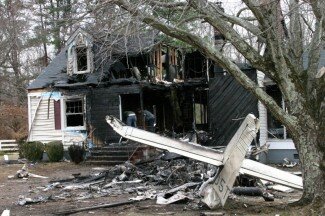Power loss: Crashed plane had history of engine trouble
Less than a week after a fatal plane crash at a front yard in Louisa, the National Transportation Safety Board has released a preliminary report which cites "a loss of engine power" and several recent bouts of trouble with the right engine of the twin-propellered Cessna which crashed March 4 shortly after take-off.
"The right engine had problems," says flight instructor Skip Degan, although he seconds NTSB investigator Bob Gretz's caution, uttered when interviewed at the site a day after the wreck, against drawing conclusions from such an early report.
Still, instructor Degan says the report's emphasis on engine troubles and power loss, coupled with witness statements that the plane was discharging grayish black smoke and appeared to be rolling before a nose-down impact point to a chilling scenario: a stall-spin.
Degan, who examined the report but is unconnected to the investigation, notes that the report found no initial evidence of catastrophic failure in either engine, but notes that any loss in an engine's power during take-off creates a vicious pull in one direction that even the best pilots may be unable to straighten.
"You've got to arrest that turn," says Degan. "And if you're close to the ground, you just don't have much time."
The pilot, James A. Youngquist, 62–- who held a commercial pilot certificate with instrument and multi-engine ratings–- died in the wreckage. His total flight experience was 2,255 hours.
According to the report, the weather was clear, and although there were crosswinds of up to 14 miles per hour, such winds lie within the range of tolerance for such a twin-engine craft.
The report indicates that several repairs conducted from late December to late January included replacing a fuel pump, a metering valve, and a turbo inlet temperature gauge. The maintenance information came from the plane's log book, which was found partially burned in the wreckage.
Gretz tells the Hook that the remains of the plane have been removed to a secure facility in Clayton, Delaware, and the engines sent off to another facility to be stripped and studied further.
–story updated with the bulk of this information at 10:43am and a little more at 12:03pm on Thursday, March 11

4 comments
Reston pilot had 40 years flying experience according to today's Washington Post; so my guess is, this was a mechanical failure, that a former blogger explained in detail at a previous Hook post, and can be a weakness of twin engine over single engine planes in certain situations.
The NTSB does a great job of determining contributing factors in situations like this. They will look at anything and everything connected to the accident and have a final finding in 10-12 months.
The pilot was clearly very experienced and it will only compound the tragedy- if the investigation finds this was due to equipment or maintenance issues, that could have been prevented.
The pilot was surely properly trained and very experienced for sure. I am sure that he did all he could to have a favorable outcome, but perhaps ran out of time to rectify the complexity of the situation.